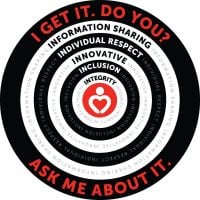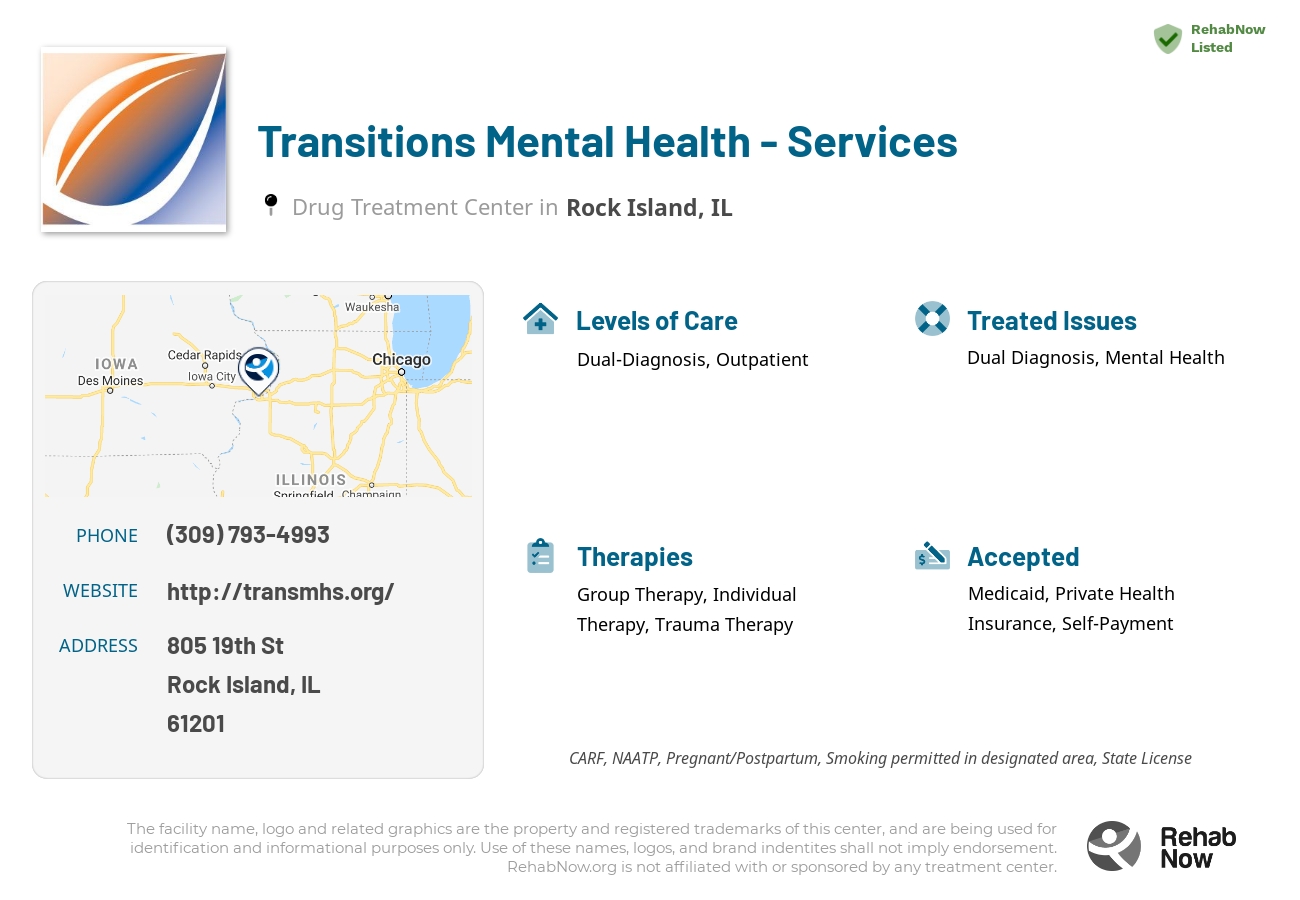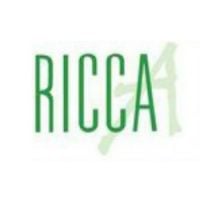
Transitions Mental Health - Services
Drug Rehab Center in Rock Island, Illinois
- Mental Health
- Dual Diagnosis
- Drug Addiction
Transitions Mental Health Services is an accredited CARF addiction treatment facility in Rock Island, IL providing dual-diagnosis, outpatient and residential levels of care and accepting private health insurance.
About This Illinois Facility
Transitions Mental Health – Services, situated in Rock Island, Illinois, focuses on dual diagnosis and mental health treatment. Recognized for its specialized approach, this center blends clinical expertise with individualized care, emphasizing the uniqueness of each person's mental health journey. Their mission stresses the importance of tailored services to meet the diverse needs of those afflicted by mental illness or struggling with addiction.
Fully accredited by CARF, Transitions Mental Health – Services upholds stringent standards in its care offerings. This accreditation highlights their commitment to excellence in dual diagnosis and mental health treatments. They accept private health insurance, making their comprehensive programs accessible to a wider community in need.
- Dual Diagnosis Focus: Uniquely equipped to handle the complexities of treating substance abuse alongside mental health issues.
- Individualized Treatment Plans: Tailored approaches ensuring that each client’s needs and circumstances are met with the utmost care.
- CARF Accreditation: Reflects their dedication to maintaining high-quality standards in therapy and patient care.
Transitions caters to individuals facing challenges such as drug addiction, alongside various mental health concerns, through a range of treatment modalities. Offering outpatient and residential care, the facility employs therapy sessions, counseling, medication management, and holistic recovery methods to address and treat the underlying causes of addiction and mental health conditions.
Genders
Ages
Modality
Additional
Accreditations

CARF
The Commission on Accreditation of Rehabilitation Facilities (CARF) is a non-profit organization that specifically accredits rehab organizations. Founded in 1966, CARF's, mission is to help service providers like rehab facilities maintain high standards of care.
Conditions and Issues Treated
An underlying cause often brings about addiction. Mental disorders can lie at the center, such as schizophrenia, bipolar disorder or anxiety disorder. As well as the cause of the addiction, a dual diagnosis by Transitions Mental Health - Services helps to treat the addiction. This ensures that after treatment is complete, the patient will not fall back on old practices.
Levels of Care Offered at Transitions Mental Health - Services
This center offers a variety of custom treatment tailored to individual recovery. Currently available are Dual-Diagnosis, Outpatient, Residential, with additional therapies available as listed below.
Outpatient treatment is treatment that occurs when a patient is not checked into a rehab facility. The patient may show up for therapy sessions, go through detox and engage in other therapies to help them recover. However, they will do so while they live at home in Illinois.
Outpatient therapy provided by Transitions Mental Health - Services is usually recommended as a follow up to inpatient therapy. It helps patients adapt to their normal lives after treatment. In some cases, it can also be an alternative to inpatient treatment. People may choose this route if they are unable to leave their jobs, children or if they don’t have the money for inpatient treatment. However, inpatient treatment is the best way to recover from addiction.
Residential treatment programs are those that offer housing and meals in addition to substance abuse treatment. Rehab facilities that offer residential treatment allow patients to focus solely on recovery, in an environment totally separate from their lives. Some rehab centers specialize in short-term residential treatment (a few days to a week or two), while others solely provide treatment on a long-term basis (several weeks to months). Some offer both, and tailor treatment to the patient’s individual requirements.
Therapies & Programs
Individual professional counseling or individual therapy refers to the one-on-one interaction between a patient and his or her counselor. Individual therapy allows for more privacy, one that group interactions can’t provide. Therefore, it becomes easier for a person to unload and become more open to his or her counselor.
Another benefit of individual therapy at Transitions Mental Health - Services in Rock Island, IL is that all sessions aim to speed up a single person’s progress. It makes it easier for the counselor and the patient to deal with the central issues, which are likely the culprits of substance addiction.
Once the roots of the problems are addressed, it becomes less challenging for a recovering patient to maintain sobriety and brush off temptations.
In group therapy, the patient undergoes sessions with other patients dealing with similar problems under the guidance of a trained counselor. The members of the group interact with each other and talk freely about their issues. The recovery of members of the group from the problems that they face gives the patients confidence that they can also overcome their addiction.
Group therapy at Transitions Mental Health - Services reduces the feeling of loneliness and improves the coping skills of the patients. Group therapy provides patients with continuous feedback from other members. The group dynamics ensure that members start having some structure and routine in their lives.
Dialectical behavior therapy (DBT) is a method of individual and/or group counseling that focuses on acceptance and change. DBT can be very effective in developing coping strategies for negative emotions.
Cognitive behavioral therapy (CBT) is a way of addressing concerns through talking. Talking through issues can identify sources of discomfort or unhealthy thoughts. CBT is a healthy way Transitions Mental Health - Services addresses some behaviors which may be bringing unintended consequences in a persons life.
Payment Options Accepted
For specific insurance or payment methods please contact us.
Is your insurance accepted?
Ask an expert, call (888) 674-0062
Additional Details
Specifics, location, and helpful extra information.
Rock Island, Illinois 61201 Phone Number(309) 793-4993 Meta DetailsUpdated April 15, 2024
Staff Verified
Patient Reviews
There are no reviews yet. Be the first one to write one.
Rock Island, Illinois Addiction Information
In 2016, more than 2,350 Illinoisans died from drug overdoses. More than 5,500 deaths annually occur in Illinois due to the abuse of alcohol and other drugs. 7.17% of Illinois residents reported using illicit drugs in the past month (2018). Substance abuse costs the state approximately $3.5 billion every year.
In 2016, there were 758 drug-related arrests in Rock Island County, and the number of drug abuse cases continues to rise. Heroin, cocaine, methamphetamine, and prescription opioids are some of the most commonly abused drugs. Options Recovery Services offers various treatment options for those looking to get sober. Many resources are available, and there is no shame in seeking assistance.
Treatment in Nearby Cities
- Belleville, IL (208.7 mi.)
- Dekalb, IL (98.6 mi.)
- Orland Park, IL (141.0 mi.)
- Beardstown, IL (103.1 mi.)
- West Chicago, IL (125.2 mi.)
Centers near Transitions Mental Health - Services


The facility name, logo and brand are the property and registered trademarks of Transitions Mental Health - Services, and are being used for identification and informational purposes only. Use of these names, logos and brands shall not imply endorsement. RehabNow.org is not affiliated with or sponsored by Transitions Mental Health - Services.



